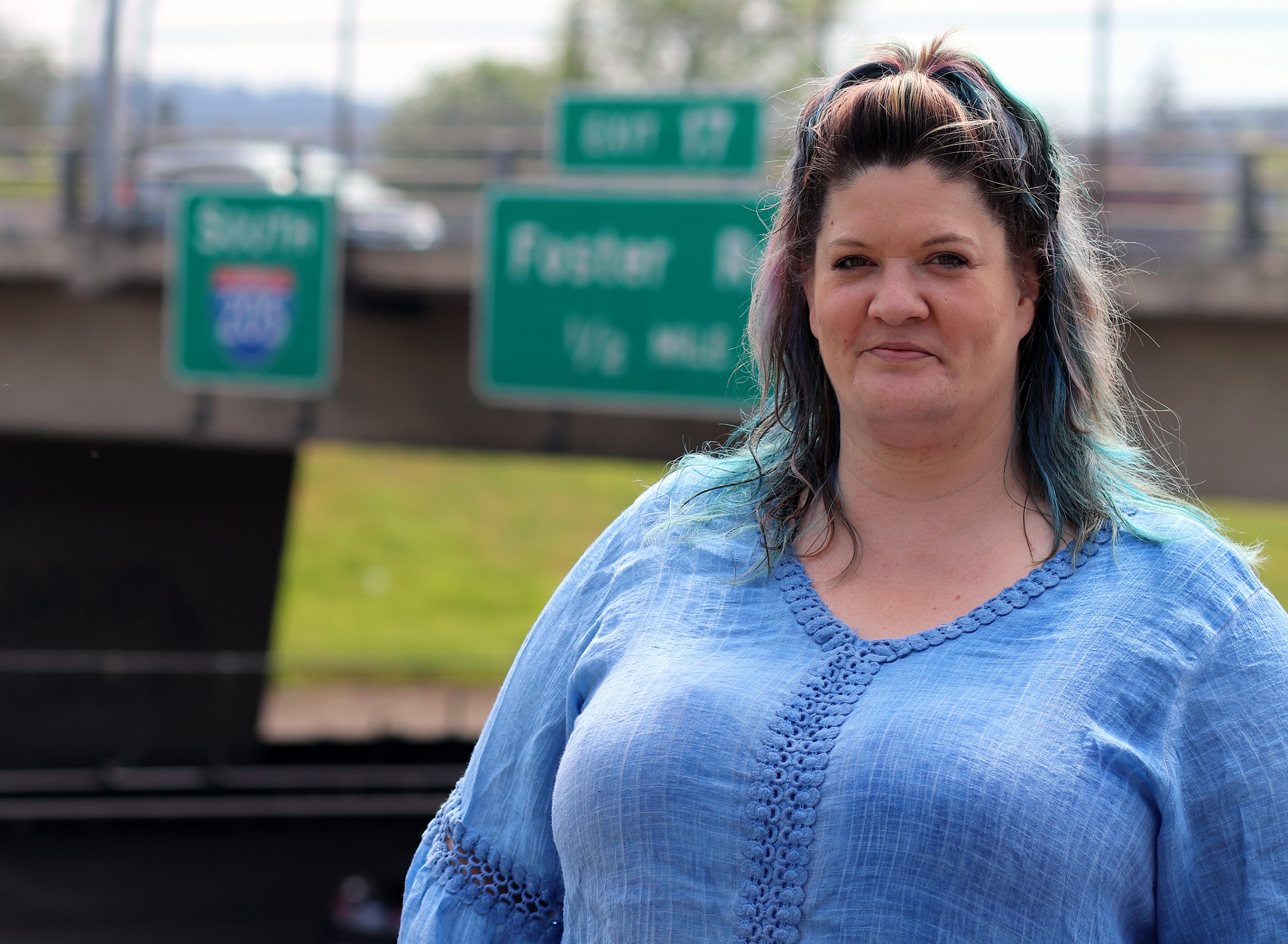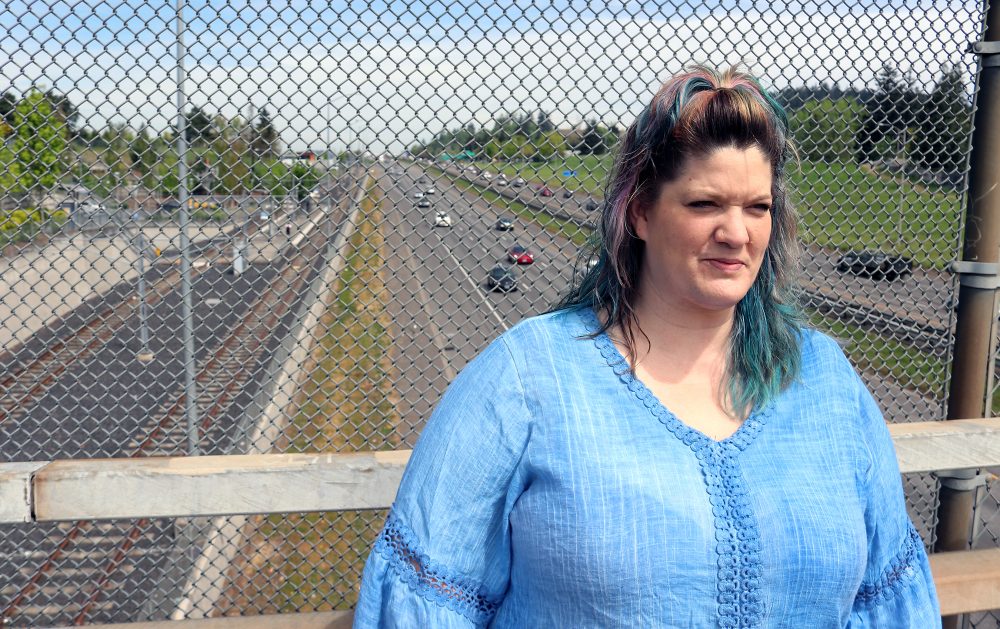This content was published: May 24, 2021. Phone numbers, email addresses, and other information may have changed.
Christi Justice uses her PCC skills and training to intervene in a mental health crisis
Photos and story by James Hill
For Portland Community College student Christi Justice, a crisp winter day in 2021 started out like any other, but she’ll never forget it.
The Lents resident was headed to work down Southeast Holgate to board a Max train. As she was walking over the I-205 overpass, she noticed a man striding fast and who appeared to be in a mental health crisis. He suddenly stopped and climbed up and over the overpass railing.
“I watched him stand there, with his arms behind him holding onto the railing, and it looked like he was trying to psyche himself up to jump,” Justice recounted. “So, as I started walking faster towards him, I’m having this conversation with myself, ‘You’re going to have to do something,’ ‘I don’t know what to do!’ and ‘Hey, you can do this because you took that class, remember?’”
Justice approached him and asked if he was okay. He ignored her. She asked again before dialing 9-1-1 on her cell phone. Still no answer.

Family and Human Services Program
- The program prepares students for entry-level human service work.
- A career-technical education program, it maintains an advisory committee as well as community partners composed of the Oregon Child Development Coalition, Multnomah County Health Department, The State of Oregon, Lifeworks NW, Passion Impact and more.
- Students are sought after and are placed in a wide variety of year-long internship sites.
“He just stood there, ready to jump and I knew not to leave him,” she said. “I told him that it looked like he needed some help. He didn’t respond and seemed to be oblivious to everything around him.”
Annoyed, the man got down and ran across the street, disappearing into the labyrinth of side streets of Southeast Portland. Justice had given the dispatch officer his description and before long officers arrived, but could never find him. It’s not the neat ending to a suicide prevention story we see in the movies or read in books, but underscores the importance of intervening.
“If I didn’t help him, who would’ve?” she asked. “I couldn’t have just walked by and done nothing. I know that by being there for someone, showing them that you care and aren’t judging them, is sometimes just what they need at that moment.”Justice credits her training at PCC, which she said gave her the confidence to aid the man in crisis and prevent him from hurting or even killing himself. She said she used a particular skill she learned called “Assess for suicide or harm, Listen non-judgmentally, Give re-assurance and info, Encourage appropriate professional help, and Encourage self-help and other supports,” or called ALGEE.
She learned this skill in PCC’s “Mental Health First Aid” (MFHA) classes. They teach students how to identify, understand and respond to signs of mental illnesses and substance use disorders. Students learn the skills necessary to reach out and provide initial help and support to someone experiencing a crisis.
“Christi didn’t have to intervene that day on the overpass, but she did because it was the human thing to do,” said Sally Guyer, family and human services instructor. “Her act of acknowledging the pain of another human changed his life and reminds all of us who hear the story of the importance of simply being kind.”
The class is offered by PCC’s Family and Human Services Program, which has nearly 300 students seeking degrees or certificates. The program prepares students for entry-level human service work in a range of environments under the direction of social workers, educators, counselors, psychologists and other specialists. The Oregon Employment Division reports that employment for social and human service assistants will grow by 15% through 2027.
PCC’s program is the only community college in Oregon to offer “Mental Health First Aid” classes as a requirement for degree and certificate programs. Starting this spring, the program partnered with the college’s CLIMB Center to offer contracted MHFA courses for community agencies, and this summer will begin to offer non-credit, public MHFA courses through the Institute for Health Professionals. The program is a member of the Council for Standards in Human Services Education and staff hope to begin the process of self-study in pursuit of national accreditation within the next year.
“Christi’s intervention exemplifies the best in our human services students – taking her skills from the classroom into the real world,” said Andrew Garland-Forshee, faculty chair of PCC’s Family and Human Services Program. “At a time when Mental Health First Aid is so desperately needed, Christi’s effort is an excellent example of how the simple task of ‘noticing’ can have a powerful impact on someone’s life.”
The 47-year-old herself returned to college as a way out of homelessness. It had been 25 years since Justice last been in school and said the return was an intimidating step forward in her life. Today, though, she is a certified peer support specialist through PCC, which will complement her associate degree in Family and Human Services this June. Justice is working toward a career of helping people in need and who may be experiencing homelessness.
“That moment helped me learn that even if you don’t think you’re capable of helping or are afraid of making mistakes, sometimes just being present and trying is all that’s needed,” Justice said. “It has made me feel more comfortable and confident in myself.”

